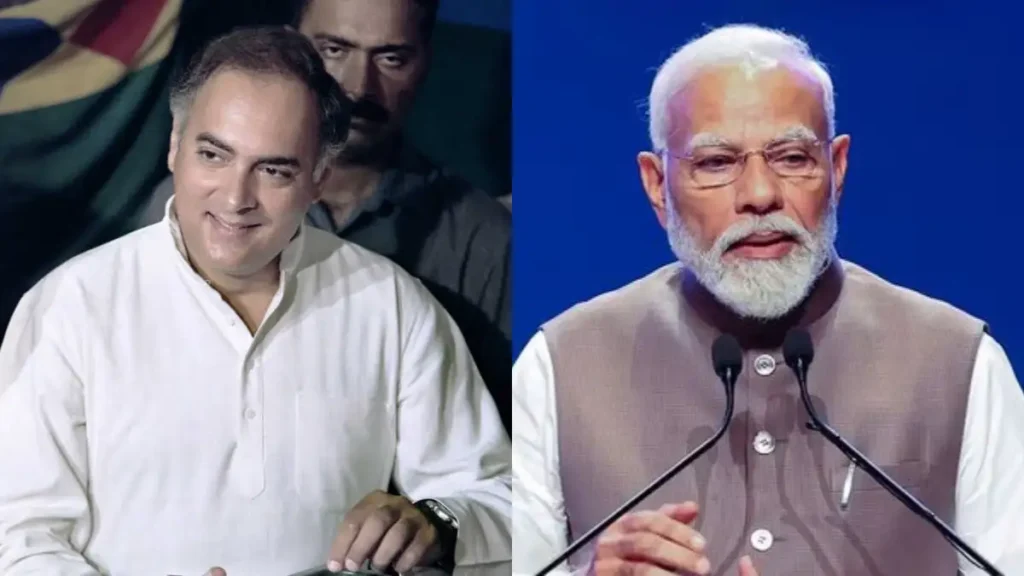PM Modi Pays Tribute to Rajiv Gandhi on His Death Anniversary
On the solemn occasion of former Prime Minister Rajiv Gandhi’s death anniversary, Prime Minister Narendra Modi paid his respects and remembered his contributions to the nation. Taking to social media platform X (formerly Twitter), PM Modi wrote, “On his death anniversary, my tributes to former PM Shri Rajiv Gandhi Ji.” This simple but respectful message reflects India’s tradition of honoring past leaders, regardless of political differences.

Remembering Rajiv Gandhi: A Visionary Leader
Rajiv Gandhi served as India’s sixth Prime Minister from 1984 to 1989. He took charge during a time of national crisis after the assassination of his mother, then Prime Minister Indira Gandhi. At just 40 years old, he became India’s youngest Prime Minister.
Despite the tragic circumstances, Rajiv Gandhi led the country with a vision focused on modernization and development. He emphasized the importance of technology, digital communication, and education. He introduced computerization to government offices and pushed India toward a future that embraced science and innovation. His leadership laid the foundation for the country’s IT revolution.
The Assassination That Shook the Nation
On May 21, 1991, Rajiv Gandhi lost his life in a tragic assassination while campaigning in Sriperumbudur, Tamil Nadu. A suicide bomber from the Liberation Tigers of Tamil Eelam (LTTE), a Sri Lankan terrorist organization, carried out the attack. The bomber approached him under the pretext of offering a garland and detonated explosives, killing him and several others.
This shocking event brought immense grief to the nation and ended a prominent chapter in Indian political history. Rajiv Gandhi’s assassination was linked to India’s involvement in the Sri Lankan civil war, particularly the Indian Peace Keeping Force’s intervention. The LTTE viewed this move as a betrayal and retaliated in the most violent way.
Honoring His Memory Every Year
Each year on May 21, India reflects on Rajiv Gandhi’s life and legacy. Political leaders, Gandhi family members, and citizens gather to pay tribute at his memorial, Vir Bhumi, in New Delhi. They offer floral tributes, observe moments of silence, and remember the values he stood for.
Congress leaders, including Sonia Gandhi, Rahul Gandhi, and Priyanka Gandhi Vadra, attend the ceremonies regularly. Their presence symbolizes both a personal and national remembrance. Prime Minister Modi’s gesture this year, though simple, highlighted the importance of putting respect above politics when it comes to national leaders.
Rajiv Gandhi’s Legacy: Vision, Reform, and Controversy
Rajiv Gandhi left behind a legacy of modernization and reform. One of his landmark decisions was to lower the voting age from 21 to 18, which empowered millions of young Indians to participate in the democratic process. He also strengthened Panchayati Raj institutions, promoting decentralized governance and bringing development closer to the grassroots.
He strongly believed in using science and technology to improve people’s lives. His initiatives brought computers to government offices and schools, helping India take its first steps toward becoming a digital society.
However, his time in office also attracted criticism. The Bofors scandal involving defense contracts tarnished his image and affected his party’s popularity. His critics also point to his handling of the 1984 anti-Sikh riots, which followed the assassination of Indira Gandhi. Though Rajiv Gandhi tried to unify the nation, some of his statements and actions remain controversial even today.
Leaders Across Parties Pay Their Respects
On his death anniversary, tributes come not just from Congress leaders but also from across the political spectrum. Rajiv Gandhi’s influence on India’s growth and development has earned him respect from various quarters. Former Prime Minister Manmohan Singh often praises him for his futuristic thinking, and current Congress President Mallikarjun Kharge called him a leader who dreamed of a “strong and self-reliant India.”
Rahul Gandhi frequently invokes his father’s memory in speeches, especially when talking about youth empowerment, education, and equality. For him, Rajiv Gandhi’s values serve as a guiding light in public life.
A Family of Sacrifice and Service
Rajiv Gandhi’s tragic death added to the Gandhi family’s long history of public service and sacrifice. His grandfather, Jawaharlal Nehru, served as India’s first Prime Minister and helped lead the country to independence. His mother, Indira Gandhi, also died in office as a victim of assassination. Rajiv’s death marked the third generation of national leaders in the family whose lives ended in violence.
For many Indians, the Gandhi family’s story is one of courage, commitment, and personal loss in the pursuit of national duty. Rajiv Gandhi’s death reminded the country of the dangers leaders face when they step forward during difficult times.
Conclusion: Honoring a Vision That Lives On
As India observes Rajiv Gandhi’s death anniversary, the messages from leaders like Prime Minister Modi show the importance of remembering those who contributed to shaping the country’s future. Rajiv Gandhi may have died young, but the ideas he introduced continue to guide India’s progress today.
His focus on youth, technology, and inclusive development still influences national policies. While opinions about his legacy may differ, few can deny his role in modernizing India and looking ahead when others hesitated. As we honor his memory, we also recognize the vision of a leader who aimed to take India forward — even if the road was difficult and the journey cut short.






